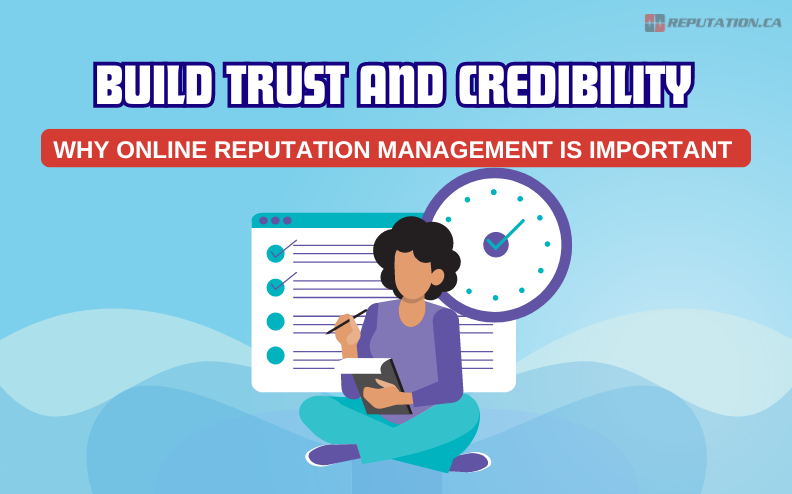Why online reputation management is important hinges on a fundamental business truth: your online image is pivotal to your success. Incorrect handling can damage, correctly managing it can lead to an increase in trust and revenue. This article explores how ORM shapes public perception and supports business growth, providing an essential framework for elevating your digital standing.
Key Takeaways
- Online Reputation Management (ORM) is crucial for shaping perceptions and maintaining control over the brand narrative, integrating SEO, public relations, and social media strategies to enhance customer trust and engagement.
- A proactive ORM strategy that includes managing online reviews, engaging with social media, and optimizing search engine presence can mitigate negative feedback and transform it into constructive engagement and customer loyalty.
- Positive online interactions and user-generated content, such as client testimonials and success stories, serve as vital components of social proof, significantly influencing decision-making and strengthening a brand’s reputation and competitive edge
The Foundation of Trust: Understanding Online Reputation Management

In the digital bazaar, trust is the currency, and online reputation management (ORM) is the mint where it’s crafted. It’s more than just a buffer against negative feedback; ORM is the comprehensive art of shaping perceptions, enhancing customer engagement, and ensuring that your brand’s narrative remains authentically yours. It intertwines SEO, public relations, and social media savvy to present a brand story that resonates with the core values of your target audience. With the help of online reputation management services, your brand can effectively navigate the complexities of the digital landscape.
At its heart, a strong online reputation is not just a nice-to-have; it’s the very lifeblood pumping through the veins of any modern business.
The Role of Online Reviews in Shaping Brand Perception
Like a digital megaphone, online reviews amplify the voice of the customer, echoing their satisfaction or discontent across the internet. In the intricate dance of brand perception, each review sways the audience, tipping the scales of trust and credibility. The math is simple: positive reviews equal revenue growth, while negative feedback can fast become a financial sinkhole. Therefore, managing online reviews on review sites with a proactive and responsive strategy is not optional – it’s essential.
Engaging with this feedback demonstrates a brand’s commitment to excellence and, when done right, transforms the casual browser into a loyal customer.

The social media landscape, including various social media platforms, is a fertile ground for nurturing online reputation. Here, every like, share, and mention on social media accounts is a potential seed for growth or a weed that must be tended. Being proactive on these platforms means more than posting content – it’s about entering a dialogue with the audience, addressing concerns, and celebrating their stories.
By leveraging user-generated content and responding swiftly to social media interactions, a brand can reinforce its positive online presence and turn customers into passionate advocates.
Search Engines as Reputation Beacons
As the gatekeepers of the digital domain, search engines wield formidable power in shaping online reputation. A brand’s search result placement is a direct reflection of its online health – a robust online reputation boosts visibility, while negative reviews can push a brand into the shadows.
Smart ORM practices, like managing unknown listings and optimizing for positive reviews, ensure that when potential customers seek you out, they find a beacon of trustworthiness and quality, guiding them to your digital doorstep.
The Domino Effect of Negative Feedback

The tremors of negative feedback can quickly escalate to a reputational earthquake, damaging sales and shaking customer trust to its core. In this interconnected online world, a single negative review can deter an entire herd of potential customers from visiting your business. The impact is not just emotional; it’s quantifiable, with revenue taking a direct hit.
This domino effect underscores the urgency of a robust ORM strategy that not only monitors feedback but actively engages with it to prevent the spread of dissatisfaction.
Transforming Negative Sentiment into Constructive Engagement
Negative sentiment need not spell doom; instead, it can be the fertile soil from which stronger customer relationships bloom. Responding to negative feedback with empathy and sincerity can turn critics into champions and mishaps into opportunities for growth. Each complaint or criticism is a puzzle piece revealing a broader picture of customer needs and potential improvements.
Engage, listen, and adapt – this proactive approach to ORM turns the tide of negative sentiment, fostering a positive image and an even stronger bond with your audience.
Mitigating the Impact of Negative Comments
A swift and thoughtful response to negative comments is like a healing balm on the reputation’s bruise. Ignoring such feedback might imply guilt, but engaging with it can rebuild trust and showcase a brand’s dedication to customer satisfaction. Offering resolutions and maintaining transparency is paramount.
With each resolved issue, a brand not only recovers but emerges stronger, with a reinforced online reputation that can withstand the occasional storm of discontent.
Building Customer Loyalty Through Positive Online Interactions

Positive online interactions are the threads weaving the fabric of customer loyalty and a positive online reputation. A brand that listens and responds with care and efficiency earns more than repeat business; it earns ambassadors who extol the virtues of the brand to others. Engaging through user-generated content, such as reviews and testimonials, creates a trusted narrative more compelling than any advertisement could ever be.
It’s these consistent and genuine interactions that solidify a brand’s online reputation and foster an unbreakable bond with its customers.
Encouraging More Positive Reviews
The art of encouraging positive reviews is a delicate balance between invitation and inspiration. By actively engaging satisfied customers and simplifying the review process, brands can increase the volume of positive feedback that serves as powerful social proof. Strategic campaigns and personalized follow-ups not only yield more reviews; they cement a brand’s reputation for valuing customer input and enhance the potential for word-of-mouth marketing.
It’s a virtuous cycle where each positive review attracts new customers and spurs further growth.
Cultivating Positive Relationships with Customers
Cultivating positive relationships with customers is akin to tending a garden; it requires patience, understanding, and consistent care. Responding to online comments and aligning customer service with the brand’s values are fundamental actions that nurture these relationships. Transparency and authenticity in these interactions are the nutrients that help trust grow.
As a result, customers become loyal allies, and their shared positive experiences act as a beacon to others seeking the warmth of a brand they can trust.
Leveraging ORM for Business Growth and Competitive Edge

Leveraging ORM is not just about damage control; it’s a strategic move towards business growth and a competitive edge. A well-executed ORM strategy is a catalyst for brand credibility and customer loyalty, transforming a good reputation into a great one.
It’s an investment that pays dividends in the form of higher ROI, increased visibility, and a robust brand image that stands out in a crowded marketplace.
Enhancing Brand Awareness and Identity
A brand’s online reputation is its beacon in the marketplace, signaling to potential customers its values, quality, and credibility. By enhancing a brand online presence and leveraging positive reviews, a brand can distinguish itself from the competition and carve out a unique identity, ultimately improving its brand’s online reputation through effective brand reputation management.
A consistent and positive narrative across digital platforms not only boosts brand awareness but also solidifies the brand’s image in the minds of consumers, making it an unforgettable player in the digital arena.
Strengthening Customer Experience and Retention
The strength of a brand’s online reputation directly impacts customer experience and retention. A brand that listens and responds to customer feedback is a brand that values its customers, and in turn, customers value such brands.
By integrating positive testimonials and reviews into the brand story, companies can increase engagement and loyalty, ensuring that customers not only return but also become vocal proponents of the brand.
Crafting a Robust Reputation Management Strategy
A robust ORM strategy includes:
- Regular assessments
- Proactive engagement
- Content management
- Crisis management
Such a strategy is not static; it evolves in tandem with the market and the brand’s growth, ensuring that the online reputation management strategy remains a glowing testament to the brand’s commitment to excellence.
Assessing Your Current Online Image
Assessing a brand’s current online image is the first step in a journey toward reputation excellence. It involves a thorough audit of digital assets and benchmarking against industry standards.
Identifying areas of strength and weakness allows a brand to tailor its ORM strategy to address specific concerns and capitalize on opportunities to enhance its online image.
Implementing a Review Process and Response Protocol
Implementing a review process and response protocol ensures that no customer feedback falls through the cracks. Equipping teams with the right tools and guidelines for responding to online reviews fosters consistency and professionalism.
This protocol is the brand’s frontline defense against reputation risks and a vital component in maintaining a positive and responsive online presence.
Utilizing Software Solutions for ORM Efficiency
In today’s digital age, ORM software solutions are indispensable tools for managing a brand’s online presence. These technological aids streamline the monitoring, analysis, and response process, ensuring that ORM efforts are both efficient and effective.
By harnessing the power of these tools, businesses can stay ahead of the curve and maintain a pristine online reputation.
The Synergy Between ORM and SEO
ORM and SEO are two sides of the same coin, intricately linked and mutually reinforcing. The careful management of brand mentions and user-generated content can significantly influence search engine rankings, highlighting the importance of a unified approach to digital marketing.
By leveraging the synergy between ORM and SEO, brands can ensure their online reputation not only glows but also grows.
User-Generated Content as an SEO Asset
User-generated content, in the form of reviews and testimonials, is an invaluable SEO asset. This authentic material naturally incorporates keywords and phrases that enhance SEO efforts and improve organic search visibility.
A robust ORM strategy that encourages the creation and sharing of user-generated content can propel a brand to the top of search results, where trust and visibility intersect.
Managing Brand Mentions for Optimal SEO Impact
Effectively managing brand mentions is a nuanced art that can elevate a brand’s SEO standing. Actively promoting high-quality content that garners positive mentions, coupled with vigilant monitoring, can have a substantial impact on a brand’s search engine rankings.
By integrating brand mentions into their SEO strategy, businesses can ensure that public perception and search engine algorithms work in harmony to enhance their online reputation.
The power of social proof in decision-making cannot be overstated. It taps into the fundamental human need for validation, using customer stories and testimonials as a lever to influence behavior. By showcasing authentic experiences and success stories, brands can harness the persuasive power of social proof to build credibility, alleviate purchase anxiety, and enhance their reputation.
Showcasing Client Testimonials and Success Stories
Client testimonials and success stories are the trophies in a brand’s showcase, evidence of its ability to deliver on promises and exceed expectations. Displaying these accolades in a prominent place, such as a website homepage or social media, can significantly improve a brand’s credibility.
It’s about making an emotional connection with the audience, highlighting real experiences that resonate more deeply than any advertising campaign could.
Aligning Brand Advocates and Community Engagement
Brand advocates are the champions in the arena of public opinion, wielding their influence to fortify a brand’s reputation. By fostering brand advocacy through social media interactions and community engagement, brands can create a loyal following that naturally generates positive social proof.
This community-driven approach to ORM not only builds a brand’s reputation but also creates an army of supporters ready to defend and promote it.
Summary
To master market trust and flourish in the digital age, embracing a comprehensive online reputation management strategy is imperative. From leveraging the power of online reviews and social media to the intricate dance of SEO, every facet of ORM is a step towards building a resilient and respected brand. By nurturing positive customer relationships, responding to feedback with empathy, and showcasing social proof, businesses can transform their online reputation into a beacon of trust that guides customers to their doors.
Frequently Asked Questions
How does online reputation management affect my business’s bottom line?
Online reputation management significantly impacts your business’s bottom line by influencing customer perception, which in turn can either increase sales or deter potential customers. Therefore, implementing ORM strategies is crucial for maintaining a positive brand image and driving revenue.
Can I ignore negative reviews if they are few in number?
No, you should not ignore negative reviews, even if they are few in number. Each negative review provides an opportunity to show your dedication to customer satisfaction and can affect public opinion (Source: Common knowledge).
How often should I monitor my brand’s online reputation?
You should monitor your brand’s online reputation regularly to address customer feedback and potential issues in a timely manner. Consider using ORM tools for real-time alerts on new mentions or reviews.
Is investing in ORM software solutions worth it?
Yes, investing in ORM software solutions is worth it as they streamline online monitoring, provide valuable insights, and contribute to a positive online presence, ultimately leading to better customer experience and business growth.
Social proof influences potential customers by providing evidence of a brand’s reliability and quality through the experiences of others. It can reduce purchase anxiety and sway decision-making, leading to increased conversions and brand trust.











